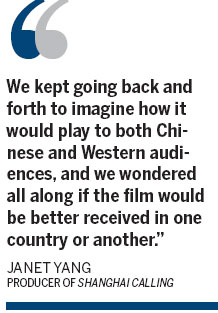A love letter to Shanghai

However, The Joy Luck Club is quintessentially Chinese-American, not purely Chinese. As such, it did not get much initial attention in China "as it did not seem to shed any new light for Chinese", but its Stateside success eventually spilled over to China.
Another cross-cultural film Yang produced was Dark Matter, starring Meryl Streep and Liu Ye, which tells the sad story of a Chinese student whose failure to adapt to American college life resulted in a rampage of violence and death.
When the accomplished Chinese-American producer was hired to spin off Disney's highly coveted High School Musical franchise into a Chinese remake, it sounded like a great idea.
However, this made-in-China-and-for-China version bombed spectacularly. Some who saw it even thought it was an unauthorized knockoff.
Signs of a dud appeared even before the film opened, as Huayi Brothers "handed the film back to Disney to market". The musical has the glossy look of a svelte mannequin but lacks the chemistry so crucial for this genre to click with its target audience.
"Perhaps the film would not have done well in any case. We'll never know," Yang reminisces. "I personally really like the songs, both the melodies and lyrics."
Shanghai Calling is definitely harder to pull off. It is a comedy that straddles two cultures. After Yang signed on as producer, she sat down with Daniel Hsia, the writer-director, to fine-tune the script.
"We kept going back and forth to imagine how it would play to both Chinese and Western audiences, and we wondered all along if the film would be better received in one country or another," she says in an interview with China Daily.
Yang's acute bicultural sensibility helped ensure that China in the movie be not seen from an outsider's point of view. Cheap shots such as Sam encountering a squat toilet in his posh apartment were removed because "we would lose significant credibility with the Chinese audience".
If pre-screenings like the one at the Shanghai International Film Festival are any indication, Yang and her team have much to laugh about.
"We've found audiences on both sides of the Pacific laugh uproariously, albeit sometimes at different parts." The fundamental reason is, "the characters are uniformly likable" and the story "is extremely refreshing and unique".
While waiting for Shanghai Calling to premiere around the world, Yang reveals her ultimate dream for her filmmaking career: a movie that is "incredibly smart, entertaining, and that can change people's view of China and Asians in general through deeply resonant portrayals", a movie that would "wow" people.
"It doesn't matter what the genre is," she adds.
















